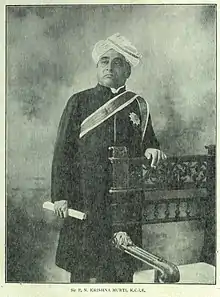P. N. Krishnamurti
Sir Purniah Narasinga Rao Krishnamurti, KCIE (12 August 1849 – 1911) was an Indian lawyer and administrator who served as the 16th Dewan of Mysore from 1901 to 1906.[1] He was a direct descendant of Purnaiah, the first dewan of Mysore.[2]
Sir Purniah Narsinga Rao Krishnamurti | |
|---|---|
.jpg.webp) | |
| 16th Dewan of Mysore | |
| In office 1901–1906 | |
| Monarch | Krishna Raja Wadiyar IV |
| Preceded by | T. R. A. Thumboo Chetty |
| Succeeded by | V. P. Madhava Rao |
| Personal details | |
| Born | 12 August 1849 Mysore kingdom |
| Died | 1911 (aged 61–62) |
| Profession | Lawyer, civil servant |

Early life and education
Krishnamurti was born on 12 August 1849 in the Kingdom of Mysore and was educated at Bangalore. He graduated in law from the University of Madras and joined Mysore Civil Service as Assistant Superintendent in 1870 during Mysore Commission. After the restoration of the throne to the Wadiyar dynasty, Krishnamurti served as a judge of the Chief Court of Mysore before being appointed Dewan in 1901. On 3 August 1905, whilst he was dewan, public electric lighting was introduced in Bangalore, becoming the first city in India to get electric street lighting. He was also the fifth Jagirdar of Yelandur estate.
He had two children, one of whom survived to adulthood.
Awards and honours
In 1897, Krishnamurti was made a Companion of the Order of the Indian Empire (CIE). He was promoted to Knight Commander of the Order of the Indian Empire in the 1903 Durbar Honours.[3][4]
Places in honour
Krishnamurthypuram, a locality in Mysore, is named after him.
References
- M.K Raghavendra (22 June 2011). Bipolar Identity: Region, Nation, and the Kannada Language Film. Oxford University Press. p. 17. ISBN 9780199088430. Retrieved 22 June 2011.
- Harry Halén (1978). Handbook of oriental collections in Finland: manuscripts, xylographs, inscriptions and Russian minority literature, Issues 31-34. Curzon Press. p. 73.
The leader of the Hebbar Iyengars, Krishnaiengar, had also died and instead they supported P. N. Krishnamurthi, the grandson of the great Purnaiya.
- "The Durbar Honours". The Times. No. 36966. London. 1 January 1903. p. 8.
- "No. 27511". The London Gazette (Supplement). 1 January 1903. p. 3.
- Mysore Gazetteer. p. 3144.